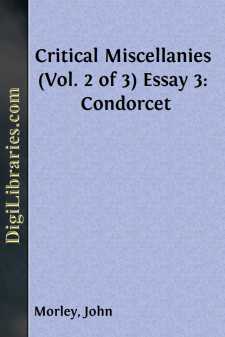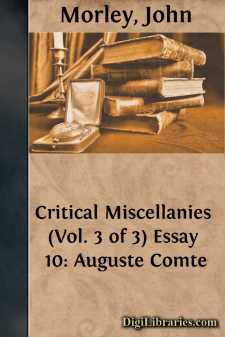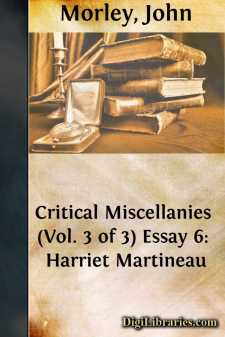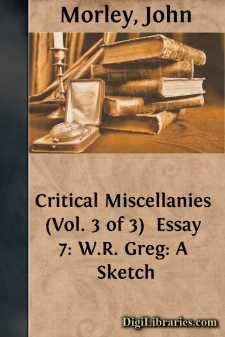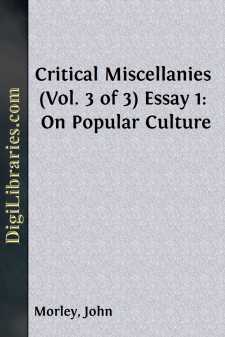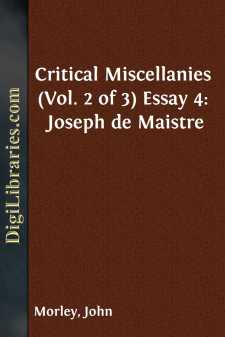Categories
- Antiques & Collectibles 13
- Architecture 36
- Art 48
- Bibles 22
- Biography & Autobiography 813
- Body, Mind & Spirit 142
- Business & Economics 28
- Children's Books 17
- Children's Fiction 14
- Computers 4
- Cooking 94
- Crafts & Hobbies 4
- Drama 346
- Education 46
- Family & Relationships 57
- Fiction 11829
- Games 19
- Gardening 17
- Health & Fitness 34
- History 1377
- House & Home 1
- Humor 147
- Juvenile Fiction 1873
- Juvenile Nonfiction 202
- Language Arts & Disciplines 88
- Law 16
- Literary Collections 686
- Literary Criticism 179
- Mathematics 13
- Medical 41
- Music 40
- Nature 179
- Non-Classifiable 1768
- Performing Arts 7
- Periodicals 1453
- Philosophy 64
- Photography 2
- Poetry 896
- Political Science 203
- Psychology 42
- Reference 154
- Religion 513
- Science 126
- Self-Help 84
- Social Science 81
- Sports & Recreation 34
- Study Aids 3
- Technology & Engineering 59
- Transportation 23
- Travel 463
- True Crime 29
Sort by:
by:
John Morley
CONDORCET. Of the illustrious thinkers and writers who for two generations had been actively scattering the seed of revolution in France, only Condorcet survived to behold the first bitter ingathering of the harvest. Those who had sown the wind were no more; he only was left to see the reaping of the whirlwind, and to be swiftly and cruelly swept away by it. Voltaire and Diderot, Rousseau and...
more...
by:
John Morley
AUGUSTE COMTE. Comte is now generally admitted to have been the most eminent and important of that interesting group of thinkers whom the overthrow of old institutions in France turned towards social speculation. Vastly superior as he was to men like De Maistre on the one hand, and to men like Saint Simon or Fourier on the other, as well in scientific acquisitions as in mental capacity, still the aim...
more...
by:
John Morley
CHAPTER I.OTHER DIALOGUES. We may now pass to performances that are nearer to the accepted surface of things. A short but charming example of Diderot’s taste for putting questions of morals in an interesting way, is found in the Conversation of a Father with his Children (published in 1773). This little dialogue is perfect in the simple realism of its form. Its subject is the peril of setting one’s...
more...
by:
John Morley
There was a moment in the last century when the Gallican church hoped for a return of internal union and prosperity. This brief era of hope coincided almost exactly with the middle of the century. Voltaire was in exile at Berlin. The author of the Persian Letters and the Spirit of Laws was old and near his end. Rousseau was copying music in a garret. The Encyclopædia was looked for, but only as a...
more...
by:
John Morley
HARRIET MARTINEAU. In 1850 Charlotte Brontë paid a visit to Harriet Martineau at Ambleside, and she wrote to her friends various emphatic accounts of her hostess. 'Without adopting her theories,' Miss Brontë said, 'I yet find a worth and greatness in herself, and a consistency, benevolence, perseverance in her practice, such as wins the sincerest esteem and affection. She is not a...
more...
by:
John Morley
I am well aware that to try to write Mr. Gladstone's life at all—the life of a man who held an imposing place in many high national transactions, whose character and career may be regarded in such various lights, whose interests were so manifold, and whose years bridged so long a span of time—is a stroke of temerity. To try to write his life to-day, is to push temerity still further. The ashes...
more...
by:
John Morley
W. R. GREG: A SKETCH. It is perhaps a little hard to undertake to write about the personality of a thinker whose ideas one does not share, and whose reading of the events and tendencies of our time was in most respects directly opposite to one's own. But literature is neutral ground. Character is more than opinion. Here we may forget the loud cries and sounding strokes, the watchwords and the...
more...
by:
John Morley
I ON PRESENTING THE INDIAN BUDGET (HOUSE OF COMMONS. JUNE 6, 1907) I am afraid I shall have to ask the House for rather a large draft upon its indulgence. The Indian Secretary is like the aloe, that blooms once in 100 years: he only troubles the House with speeches of his own once in twelve months. There are several topics which the House will expect me to say something about, and of these are two or...
more...
by:
John Morley
The proceedings which have now been brought satisfactorily to an end are of a kind which nobody who has sensibility as well as sense can take a part in without some emotion. An illustrious French philosopher who happened to be an examiner of candidates for admission to the Polytechnic School, once confessed that, when a youth came before him eager to do his best, competently taught, and of an apt...
more...
by:
John Morley
JOSEPH DE MAISTRE. Owing to causes which lie tolerably near the surface, the remarkable Catholic reaction which took place in France at the beginning of the present century, has never received in England the attention that it deserves; not only for its striking interest as an episode in the history of European thought, but also for its peculiarly forcible and complete presentation of those ideas with...
more...


